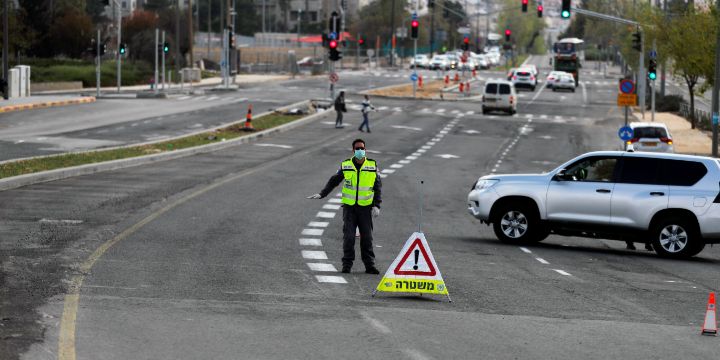Israel Closes Off Jerusalem’s Ultra-Orthodox Areas to Stem Coronavirus Spread
 by Reuters and Algemeiner Staff
by Reuters and Algemeiner Staff

Israeli police set a roadblock on a street in Jerusalem as they try to contain the spread of the coronavirus disease (COVID-19) from the densely populated neighborhoods where the infection rate is high, April 12, 2020. Photo: REUTERS/ Ammar Awad.
Israel locked down mainly ultra-Orthodox Jewish areas of Jerusalem on Sunday to try to contain the spread of the coronavirus from the densely populated neighborhoods where the infection rate is high.
The entry and exit restrictions, enforced by police roadblocks, were imposed on the same day that a government order for the wearing of masks in public went into effect throughout the country.
Residents of the restricted neighborhoods in Jerusalem can still shop close to home for essentials but synagogues have been closed to try to stem infections, an edict in force across Israel.
The neighborhoods are home to large families living in close quarters. Compliance with social-distancing guidelines has been spotty.
Bnei Brak, an ultra-Orthodox town of 200,000 near Tel Aviv, was declared a restricted zone on April 2 and police have limited access to the area.
Israel has reported 10,878 confirmed coronavirus cases and 103 deaths. Palestinian officials listed 268 cases in the West Bank and in the Gaza Strip, with two fatalities.
In the West Bank, Palestinian Finance Minister Shukri Bishara said the Palestinian Authority (PA) asked Israel to help it grapple with economic hardship caused by the coronavirus crisis.
Bishara said he requested Israel transfer a minimum of 500 million shekels ($140 million) a month to the PA as part of tax revenues that Israeli authorities collect on behalf of the Palestinians.
In all, Israel usually collects some 700 million shekels ($195 million) a month, in return for a 3% commission, in tax revenues for the PA from imports that arrive via Israeli ports. But the PA expects such revenues to decline by more than 50% due to reduced trade during the coronavirus crisis.
“If Israel agrees to pay us 500 million shekels a month, we can add another 200 million shekels ($56 million) monthly aid from donor countries, in addition to 100 million shekels ($28 million) from local revenues,” Bishara told reporters via a video link.
“That would make us 200 million shekels short (of normal figure), a sum we can make up for through taking (bank) loans,” he said. “That should keep us going that way for six months.”
He said there was no immediate official word from Israel on the request but indications were positive.
 Police Stop Anti-Zionist Agitators From Accessing Florida University President’s Home as Students Revolt Nationwide
Police Stop Anti-Zionist Agitators From Accessing Florida University President’s Home as Students Revolt Nationwide Nearly One in Five Young People Sympathize With Hamas, 29% Say US Should Reduce or End Alliance With Israel: Poll
Nearly One in Five Young People Sympathize With Hamas, 29% Say US Should Reduce or End Alliance With Israel: Poll Ilhan Omar Silent After Daughter’s Arrest, Suspension for Role in Columbia University Anti-Israel Protest
Ilhan Omar Silent After Daughter’s Arrest, Suspension for Role in Columbia University Anti-Israel Protest Cultural Center Backed by Iran’s Revolutionary Guard Plans to Produce Films About Attack on Israel
Cultural Center Backed by Iran’s Revolutionary Guard Plans to Produce Films About Attack on Israel How Does Ilhan Omar Really Feel About Iran?
How Does Ilhan Omar Really Feel About Iran? This Passover, Combine Respect for Tradition with the Courage to Innovate
This Passover, Combine Respect for Tradition with the Courage to Innovate Israel’s Iran Attack Carefully Calibrated After Internal Splits, US Pressure
Israel’s Iran Attack Carefully Calibrated After Internal Splits, US Pressure Palestinian Cameramen Exposed in New Footage Documenting Oct. 7 Atrocities Side by Side with Terrorists
Palestinian Cameramen Exposed in New Footage Documenting Oct. 7 Atrocities Side by Side with Terrorists US Money to Convicted Terrorists; US Training to Aspiring Terrorists
US Money to Convicted Terrorists; US Training to Aspiring Terrorists Man Arrested in Paris After Iran Consulate Incident
Man Arrested in Paris After Iran Consulate Incident



 Israel’s Iran Attack Carefully Calibrated After Internal Splits, US Pressure
Israel’s Iran Attack Carefully Calibrated After Internal Splits, US Pressure This Passover, Combine Respect for Tradition with the Courage to Innovate
This Passover, Combine Respect for Tradition with the Courage to Innovate How Does Ilhan Omar Really Feel About Iran?
How Does Ilhan Omar Really Feel About Iran? Cultural Center Backed by Iran’s Revolutionary Guard Plans to Produce Films About Attack on Israel
Cultural Center Backed by Iran’s Revolutionary Guard Plans to Produce Films About Attack on Israel Ilhan Omar Silent After Daughter’s Arrest, Suspension for Role in Columbia University Anti-Israel Protest
Ilhan Omar Silent After Daughter’s Arrest, Suspension for Role in Columbia University Anti-Israel Protest